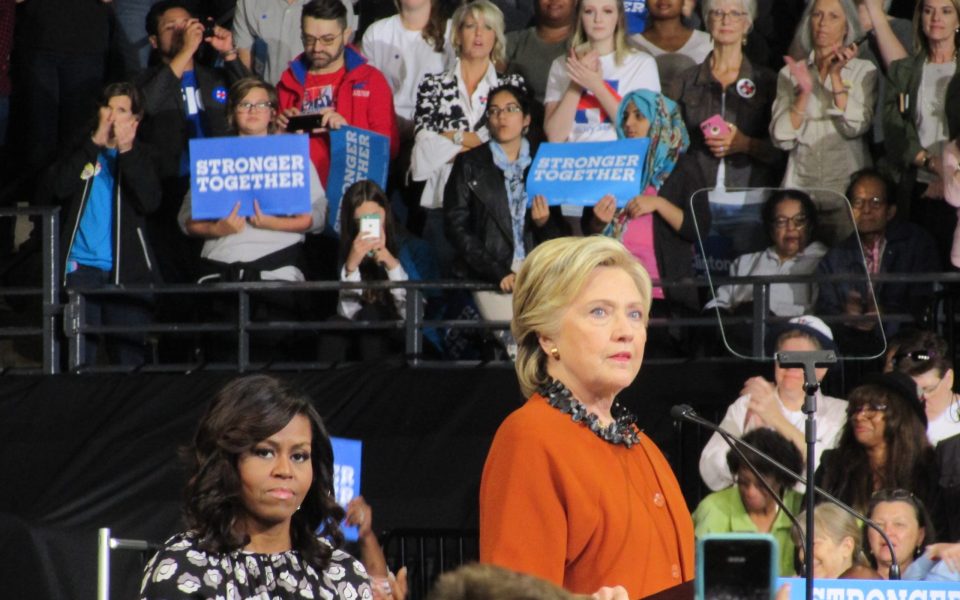The connection between the civil rights movement and classic Winston-Salem soul music might not be obvious to everybody, but the throwback concert by Odyssey 5 and Eliminators II at the International Civil Rights Center & Museum on Sept. 2 was a fitting occasion to kick off ArtsGreensboro’s Fabric of Freedom series.
Odyssey 5 is likely not a household name, but First Time Around, the album recorded by five young women from Winston-Salem for Brunswick Records in the mid-1970s, showcases the group’s dynamic vocal mix with taut funk backing and orchestral arrangements that distinctly evoke the period. The Mighty Eliminators have established a reputation as an ace live band in the Twin City. (The spinoff group that performed on Sept. 2 scrupulously identified themselves as Eliminators II to acknowledge a significant evolution in personnel.) Both groups have resurfaced recently, with Odyssey 5 reuniting for a concert at SECCA in 2011, and the Mighty Eliminators resuming as a live band in their hometown in 2012.
The Sept. 2 concert went heavy on nostalgia though both bands gave short shrift to their original material, perhaps reasoning that it wouldn’t be as familiar to the audience. Odyssey 5 lead vocalist Carlotta Fleming introduced a number of the songs by saying, “Remember this one?”
She noted the continuing relevancy of Marvin Gaye’s “What’s Going On” and later led the group into a rendition of the Staple Singers’ 1972 hit “I’ll Take You There,” a song with heavy spiritual overtones that has come to signify a communitarian vision of social uplift.
No doubt much of the music of Odyssey 5 and the Mighty Eliminators in their ’70s heyday was about romantic relationships and partying, but it fits the social justice theme of the Fabric of Freedom series. The early ’70s was a high-water mark of black power, with the Civil Rights Movement having consolidated legal guarantees to the electoral franchise, access to public accommodations, integrated schools and fair housing. Deindustrialization was still on the horizon, and African Americans had made some inroads in securing decent paying jobs manufacturing jobs. Whether it’s the Staple Singers or Stevie Wonder, there’s an assertiveness and confidence, mixed with a strong sense of social solidarity, that gives the music of the period immense appeal and staying power.
The theme of social solidarity was conveyed by Odyssey 5’s Fleming and Sylvania Wilson talking about their affection for each other as friends who grew up together in Winston-Salem, and Fleming introducing a cover of the 1979 Sister Sledge hit by saying, “So you know we certainly are family.”
It came across in the emphasis on women getting respect, or “propers,” as the female vocalist of Eliminators II put it, introducing a cover of Kool & the Gang’s “Ladies Night.”
Still, the idea of music as a soundtrack for a social movement only stretches so far. No musician, especially ones as talented as these, wants to be put in a box. Musicians who get good at their craft want to be recognized for their versatility. If the idea of the showcase was to provide a musical snapshot of black social life in the 1970s, Eliminators II proved culture is fluid by applying the same unstoppable groove to a rendition of Steely Dan’s “Peg” as Kool & the Gang’s “Boogie Shoes.”
That said, it would have been nice to see some of the connections spelled out for the benefit of those in the audience who weren’t in the clubs or in the streets in Winston-Salem and Greensboro in the ’70s.
It would have been interesting to hear Forsyth County Commissioner Walter Marshall talk about the Dungeon, the nightclub owned by the late Rodney Sumler on Liberty Street that showcased the Mighty Eliminators while also providing a meeting place for the Winston-Salem chapter of the Black Panther Party. Or to hear activists Nelson and Joyce Johnson talk about cutting loose at Cosmos II, a legendary hotspot in Greensboro that was open during the same period.
Musicians and artists don’t galvanize social change — that’s the work of people organizing marches, leading voter-registration drives, bearing pressure down on elected officials and launching enterprises for the betterment of the community. But when the movement captures people’s imagination, artists and musicians who are in tune with the community can’t help but reflect its higher consciousness.
Join the First Amendment Society, a membership that goes directly to funding TCB‘s newsroom.
We believe that reporting can save the world.
The TCB First Amendment Society recognizes the vital role of a free, unfettered press with a bundling of local experiences designed to build community, and unique engagements with our newsroom that will help you understand, and shape, local journalism’s critical role in uplifting the people in our cities.
All revenue goes directly into the newsroom as reporters’ salaries and freelance commissions.





Leave a Reply